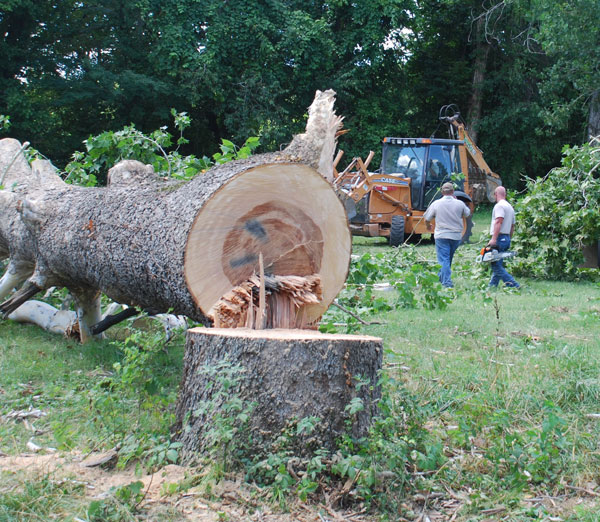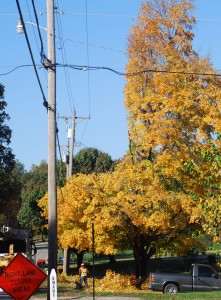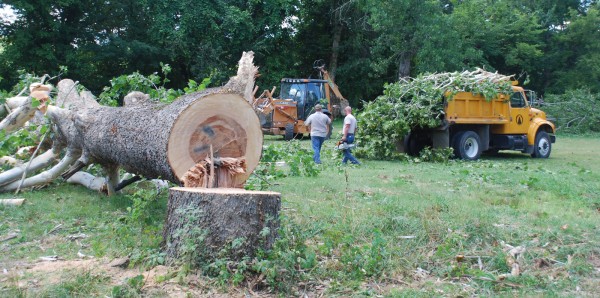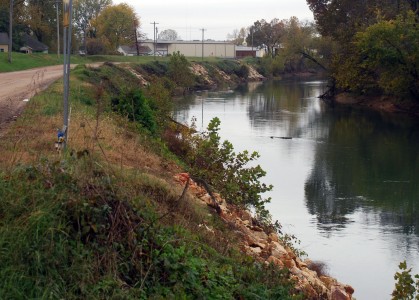In Remembrance of Trees

POPLAR BLUFF – Joni Mitchell wrote a song called “Big Yellow Taxi” back in 1970. The lyrics poke fun at the absurdity of a civilization where we “paved paradise and put up a parking lot.”
Since then, a lot of people have taken up the cause of trees because we really don’t want to have to pay to see them in a tree museum. Through much environmental education we’ve learned that trees are vital to the survival of our planet. If trees don’t survive, neither do humans.
Also see “From The Publishers Desk (11/06/2014)”
In Missouri, trees are center stage this time of year, putting on a color show that beats anything an artist can paint.
Even Poplar Bluff recently got into protecting trees when the Poplar Bluff City Council approved an ordinance to protect trees through a more ecologically sound way of balancing trees and utilities in the city.

A tree trimming company, hired by the utilities department, improperly pruning trees even after the new city ordinance was in place
Ordinance 7741 was passed on October 20, 2014, and with it, the city vowed to develop a board to oversee the planting, maintenance, and removal of trees, shrubs and other plants in the city. The ordinance went into effect with its signing.
But several citizens of Poplar Bluff have complained that the ordinance is not being observed by city utility crews and those the city has contracted to prune trees to keep utility lines safe.
One Poplar Bluff woman described the Townsend Corporation vehicles that are often seen at tree trimming and removal sites as “death squads for trees.” They, with Municipal Utilities orders in hand, are still butchering city trees in the name of safe-guarding utility lines throughout the city.
So, the question is, why?
According to the ordinance, a board was to be appointed to oversee these activities in order to safeguard trees and prevent unnecessary cutting. The direction from Poplar Bluff City Manager Heath Kaplan was that no more cutting is to be done until the board is in place to oversee the process.
Kaplan noted that recently a complaint came in about a tree being trimmed on Barron Road. Kaplan said that Angela White, who is a horticulturalist and arborist with the city’s Parks and Recreation Department, was dispatched to the scene to talk to the trimmers. They told her they were unaware of the recent ordinance dealing with tree trimming.
Kaplan said he thinks the problem is one of communication. Evidently Municipal Utilities Manager Bill Bach had not yet passed on information about the new ordinance to the crews doing the work. Kaplan said that will soon be remedied.
In the meantime, citizens like John Stanard continue to voice their concern for how trees are treated in the city.
“I was really happy to see this ordinance passed,” said Stanard. He noted this was not the first time such an ordinance was proposed.
“About six years ago, people from our community who were concerned about how tree trimming was being done in the city got together, researched the topic and came up with suggestions based on what other cities were doing to protect their trees,” said Stanard.
The measure never gained any momentum with the former city manager or the city council.
When the new city council was elected and City Manager Kaplan came into office, Stanard says the group re-visited the issue of the ordinance and found support for it.
“I’m not a tree-hugger sort of person,” explained Stanard, “but I do think it is important to save our community’s trees and manage them well for aesthetic purposes and for ecological purposes. There has to be a balance.”
He said he understands the need to protect utilities but contends that a much better job can be done to both protect utilities and save trees. It comes down to education.
“The city utilities contractor has not been using the best pruning practices,” said Stanard. “And in many cases they are just cutting down the entire tree.”
He was especially disturbed to see a sycamore tree believed to be well over 100 years old cut down. The tree was cut down at Roxie Road and Maud Street.

Approximately 100-year-old sycamore tree cut down by the Street Department with no real threat to the power lines
“A lot of people considered that as a landmark tree, and I personally remember that tree as a child,” said Stanard. “It was in an open area. It was no threat to utilities. I measured 47 feet from the stump to the utility wire.”
He recalled the day that tree was taken down. A woman stopped her car to talk to him about it while he was snapping photos of the felled tree.
“She was just sick about it,” said Stanard.
Another practice that has disturbed Stanard is that often private property owners have been told that trees in their yard are not an immediate utilities problem but could become a problem in the future.
“These crews encourage people to have the tree taken down because the city will bear the cost of it,” said Stanard. “In my opinion, that is abuse. Many of these people did not realize they had a choice in the matter.”
The result is Poplar Bluff, a city named in honor of its trees, is becoming increasingly treeless.
“Even if the tree is not cut down, when it is not pruned correctly, it will die [over the next 25 years],” said Stanard.
He noted that a sugar maple on his street was recently pruned in such a way that not only made the tree look odd, but made it more dangerous because it is unbalanced.
“It was a beautiful tree. And there was no reason to have pruned it in that way,” said Stanard, shaking his head.
He’s also very disturbed at the number of trees that have been cut in the Pike Creek Valley and along the banks of the Black River.
And put them in a tree museum
Then they charged the people
A dollar and a half just to see ’em
Joni Mitchell Big Yellow Taxi
To stop erosion, the city put in rip-rap, at thousands of dollars in expense, for a problem they created themselves.
“Obviously this was not done to protect utilities,” said Stanard. “So I really can’t conceive of why they would do that. Nature created a perfect system for battling erosion, and we should respect that.”

Almost a third of a mile of the river bank has been denuded of trees (looking upstream along Black River from the intersection of Saxon and Ashcroft streets, Schaller Hardwood’s building can be seen in the background)
Ruth and Ronnie Carl have fished along that section of the river for years, but now cannot traverse the shaky footing of the rip-rap. The Carls said they used to catch “enough catfish for us” along the bank but now there’s no shade from the sun’s heat for them or the fish.
Stanard noted that it is important to protect the city’s trees not just for aesthetic reasons but for economic ones as well.
“One of the first things a company or people do when they are looking at locating in a town is to look at the town aesthetically. No one wants to live on a Moonscape.
“We need to have an attractive tree scape to entice more families and more business to Poplar Bluff,” said Stanard.
Trees are important because they keep our community more comfortable by slowing down the wind and creating shade. Even more importantly, the trees clean the air and infuse it with the oxygen we need.
He hopes that City Manager Kaplan gets the board charged with overseeing the care of the city’s trees formed quickly, and that cutting of all trees is put to a halt until it can be done correctly.
“To lose a tree is to lose a piece of our community’s history,” concluded Stanard. “That is something that should not happen unless there is no alternative.”
If trees could talk, they could tell much about the generations of humans they observed.
They could tell about the children who played beneath their shade in summers past and climbed them for a better view of their world, and the little critters that made their homes in them.
But perhaps the sadder story is told by the trees that were chopped down or mangled. Those trees tell the story of humans who were short-sighted.
Because as the song goes, “You never know what you’ve got ‘til it’s gone.”

I’m wanting to plant more fruit trees. I love them. I love the blooms, and I definitely love the fruit! And bees and hummingbirds love them! Win-Win all around!
When you lose one, plant two!
True. Nature has her reasons. Unfortunately, people often just make plain bad and short-sighted decisions.
After a storm, I go for a walk in my woods and see how many trees went down. So sad but I understand that it is so good for the animal habitat!